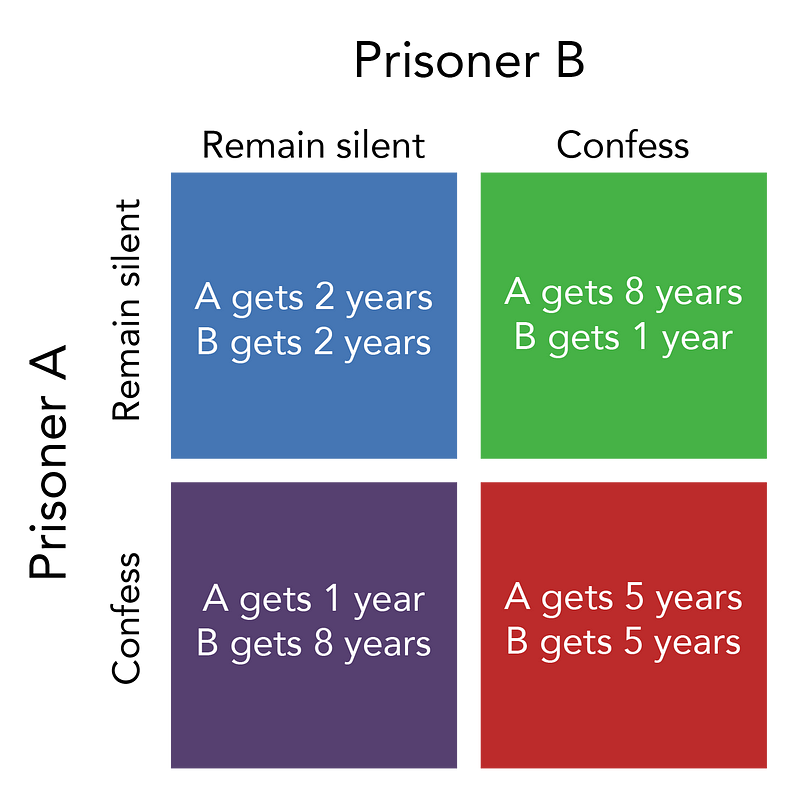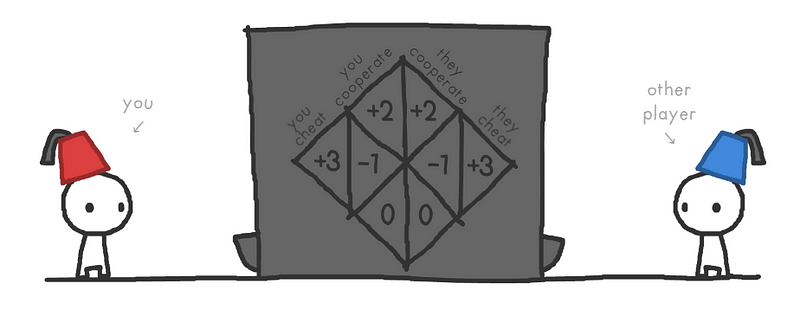Winning Life's Game: Success Through Kindness and Cooperation
Written on
Chapter 1: The Path to Success
What defines success in life? This question has countless responses, filling entire sections of bookstores and the internet. However, what separates successful individuals from those who struggle? Is it true that being self-centered is necessary for success, as only the “strongest” prevail?
Surprisingly, the answer can be found in a simple computer simulation that challenges conventional wisdom.
Consider two thieves who are apprehended and placed in separate interrogation rooms. They face a choice: to remain silent or to confess. If both choose silence, they each serve two years. If both confess, they receive five years. However, if one remains silent while the other confesses, the confessor serves just one year, leaving the silent partner with an eight-year sentence.

This scenario illustrates the "Prisoner's Dilemma," which reveals that without communication or trust, people often fail to cooperate, even when it would be mutually beneficial. This dilemma raises a broader question: Is cooperation and altruism more advantageous than selfishness?
The Evolutionary Question
What does evolution favor: altruism or selfishness? The Prisoner's Dilemma prompts us to consider whether successful individuals tend to be more altruistic or egoistic.
The Introduction to Game Theory
Following the Prisoner's Dilemma, Professor Robert Axelrod, a researcher in human behavior and evolution, conducted experiments to determine which behaviors—cooperation or betrayal—are most effective for individual success.
Successful individuals share four key traits:
- Kindness: They are friendly and do not exploit others' weaknesses.
- Forgiveness: They are willing to forgive when wronged.
- Provocation: They respond to unfair treatment, showing they won't be intimidated.
- Clarity: Their reactions are straightforward and easy to understand.
How did Axelrod arrive at these conclusions?
Axelrod's Experiments
Imagine a game played over multiple rounds between two players, where each round presents the choice to cooperate or cheat, without any communication. Players only learn the other's choice after making their own.
- If both cooperate, they each earn two points.
- If both cheat, they earn nothing.
- If one cheats while the other cooperates, the cheater gains three points, while the cooperator loses one.

This game allows for a variety of strategies: some players are cooperative, while others exploit their opponents’ weaknesses. The researchers observed how these different strategies performed against each other.
The Winning Strategies
Axelrod discovered that the strategies characterized by kindness, forgiveness, provocation, and clarity consistently outperformed those that were nasty, unforgiving, non-provocative, and complex.
What does this imply about human behavior and evolution? Axelrod's findings suggest that individuals who embody these positive traits tend to achieve greater success across various aspects of life, including politics, business, and personal relationships.
Conclusion: Key Takeaways
Upon reflecting on these findings, I realized that I had already been applying some of these principles, aligning with the teachings of Dale Carnegie and biblical wisdom on human interaction. Here are four crucial lessons derived from Game Theory:
- Kindness leads to victory.
- Forgiveness is not a sign of weakness.
- Standing up for oneself when mistreated is essential.
- Being clear in communication doesn’t equate to being dull; it positions you as a winner.
This is the pathway to success and how to triumph in life's game.
Chapter 2: Insights from Game Theory
The first video titled "How to Make Your Life a Video Game" explores the concept of treating life as a game, offering strategies to approach challenges with a playful mindset.
The second video, "THE GAME OF LIFE BUT CRAZIER! | No Time To Relax [Part 1/2]," takes a humorous look at the complexities of life and how to navigate them effectively.
Please consider supporting my work by commenting and sharing this story with those who may find it valuable. Subscribe to receive my updates directly via email or leave a tip if you wish to contribute.